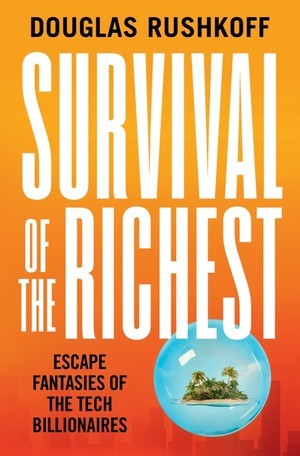sol2070 reviewed Survival of the Richest by Douglas Rushkoff
Tasty chronicle
5 stars
(em português → sol2070.in/2024/03/sobreviv%C3%AAncia-dos-mais-ricos-douglas-rushkoff/ )
The attitudes of techno-billionaires are rather indigestible, but they have made for a tasty non-fiction book in Douglas Rushkoff's chronicle: "Survival of the Richest" (2023). Rushkoff is an influential countercultural author in the field of technology. He reflects on the mentality of the current generation of plutocrats who plan to walk around immune to the planetary destruction they cause. Although the book's subtitle is "Escape fantasies of tech billionaires", it's not just about the hope of escaping to Mars or "evolving" into an immortal digitised consciousness. A central theme is an ideology that the author has baptised "The Mindset", a common denominator in the attitude of these billionaires of the digital age. As the book is practically entirely about this, it's not easy to summarise the concept. But The Mindset is a kind of supremacism, a sense of superiority based on wealth, power and technology, in which there are no limits to the exploitation of others or damage to the environment and other beings, and no lack of imagination about a complete immunity to negative consequences, as if they were on a higher evolutionary level. A passage I've highlighted about an almost "anatomical" characteristic of these billionaires: "Studies have shown that the more power a person has, the less “motor resonance ” or mirroring they do of others. Of course, people seeking power may be predisposed to this behavior. But further research has suggested that after people have gained power, they tend to behave like patients with damage to the brain’s orbitofrontal lobes . That is, the experience of wealth and power is akin to removing the part of the brain “critical to empathy and socially appropriate behavior.” Poorer people are much better than their wealthy counterparts at judging other people’s emotions. Their capacity to make “empathetic inferences” based on facial muscle movements is far superior."
Curiously, this inflated idea of themselves also feeds a saviour complex in some. They believe they are doing good for the progress of humanity. Another, more or less related passage: "As Google co-founder Larry Page puts it, human DNA is just “600 megabytes compressed , so it’s smaller than any modern operating system … So your program algorithms probably aren’t that complicated.” This model of human biology is as reductive as Dawkins’s contention that “life is just bytes and bytes and bytes of digital information.” Just as Francis Bacon and the early empirical scientists denied any aspect of nature that could not be quantified, today’s digital reductionists would have us deny any aspect of the human experience that cannot be quantized as code. Everything can be represented as symbols. It’s all just information. Nothing weird, wet, or truly wild. The ultimate nerd religion."
Since Rushkoff is a respected chronicler of the digital revolution, he circulates fluently in Silicon Valley. He recounts various interactions with these types of people. For example, when millionaires called him for a consultation on post-apocalyptic financial strategies. "How can you guarantee that they will obey me in a world where money will no longer have any value?", they asked him. On another surreal occasion, he went to evaluate a VIP corporate version of the Burning Man techno-psychedelic festival. The book is as captivating as his podcast Team Human -- currently the only podcast that I listen to. By the way, the origin of the name is explained in the book. The pope of singularists Ray Kurzweil once sneered at Rushkoff's take on his utopia of digitised consciousness, saying: "You say that because you're human".
"Of course I'm human, I'm on team human," Rushkoff replied.

